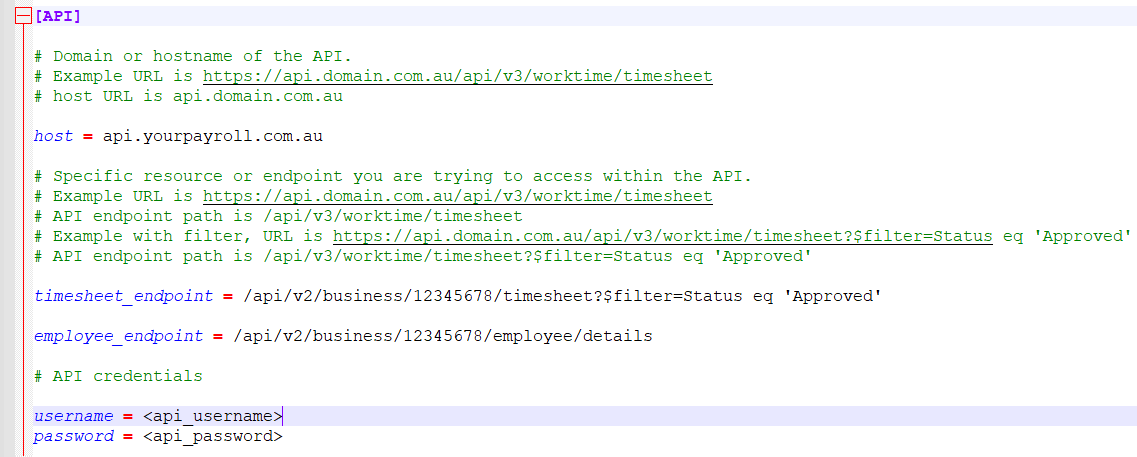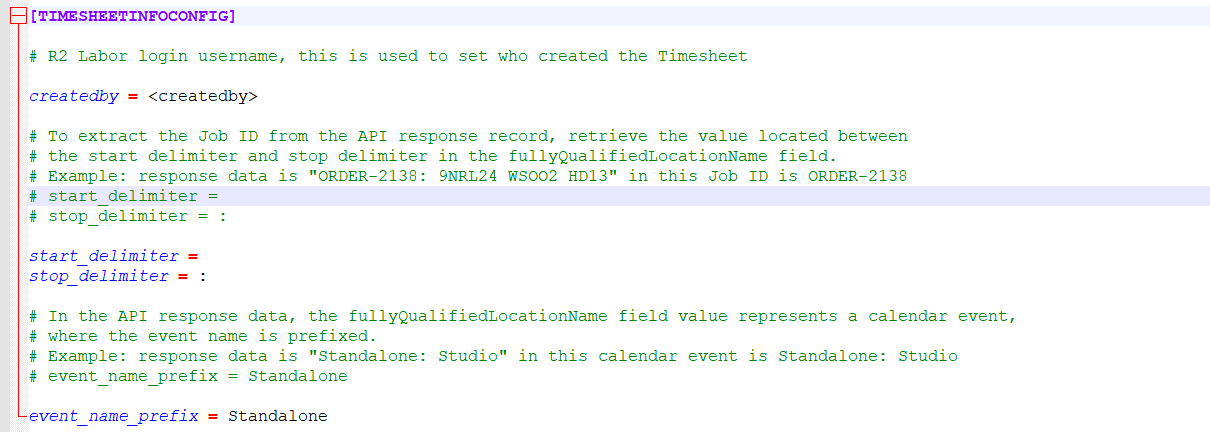Integrating Time Logs from Employment Hero
Overview
This feature enables timesheet creation in R2 Labor by importing approved work time logs of resources from the Employment Hero (EH) application against the jobs/bookings/calendar events the resources have worked on. The timesheet and associated actual costs will then be reflected within R2 Labor.
Prerequisites
Ensure the following prerequisites are met:
Install components on the client machine:
Python
Oracle SqlPlus Client
Oracle Sql* Loader
Set up R2 Labor with:
An order with at least one labor position added.
Assigned resources to those positions with status "Confirmed".
A defined start and end date for each assignment.
EWT records defined for the same date range.
A calendar event definition.
Configuration
Setting up EmploymentHeroAPIConfig.ini
The configuration file EmploymentHeroAPIConfig.ini, located at:
../CustomScripts/EmploymentHeroIntegrationForTimesheet/Sections and Fields
Field Name | Description |
|---|---|
[API]Host | Domain or hostname of the API. |
[API}timesheet_endpoint | Specific resource or endpoint you are trying to access within the API for the timesheet. |
[API}employee_endpoint | Specific resource or endpoint you are trying to access within the API for the employee details. |
[API]Username | API credentials |
[API]Password | API credentials |
[Database]schema_username | Username for Oracle schema being used. |
[Database]schema_password | Password for the above Username |
[Database]service_name | Configured Service Name for the Schema being used. |
[TimesheetInfoConfig]createdby | R2Labor user who created the Timesheet |
[TimesheetInfoConfig]start_delimiter | Start and Stop Delimiter are used to extract the following values from the Start_Delimiter field can be blank.
|
[TimesheetInfoConfig]stop_delimiter | |
[TimesheetInfoConfig]event_name_prefix |
The ‘event_name_prefix’ is picked from the above setting and matched the with ‘Description’ text of all the ‘Calendar Events’ definitions in R2Labor, to ascertain if the extract record is indeed a ‘Calendar Event’ or not.
See below, screenshot of a sample INI file
Execution Modes: dry_run vs live_run
The integration batch program must be executed with a required parameter to determine the execution mode:
dry_run:Only generates success and failure logs
No timesheets are created
Useful for previewing potential outcomes
live_run:Processes valid EH records and creates timesheets
Generates success and failure logs
If neither parameter is provided, the program will terminate immediately.
To separate manual and scheduled usage, users can run the integration in either mode as per requirement.
How Sync Works?
For a record from Employment Hero to be successfully processed:
A matching EWT record must exist in R2 Labor
A matching calendar event (either existing or auto-created) must exist
Only records with Approved status in EH are considered.
Enhanced Handling of Mixed Record Validity
Valid records are processed and integrated
Invalid records (e.g., missing Resource ID, duplicates) are skipped
The batch continues processing without being blocked
Timesheet Naming Convention
Timesheets will be named:
Processed from EH <From Date> - <To Date>If a timesheet with the same name already exists, a suffix like
_01,_02, etc., is appendedFrom DateandTo Datereflect the earliest and latest timesheet linesTimesheet type will be
Week
Log Files & JSON Payload
For each execution:
Two CSV logs are generated:
One for successfully processed records
One for failed records with detailed reasons
JSON Extract:
Contains the full EH response payload
Placed alongside the logs for reconciliation
Folder Structure
Success Folder:
If all records succeed
Stores success logs and JSON response
Failure Folder:
If some or all records fail
Stores failure logs, success logs (if partial success), and the JSON response
File Naming Convention
All logs and JSONs will follow this format:
Live_Run_<Order Description>_<YYYYMMDD>_<HHMMSS>.JSON
Live_Run_Failure_Details_<YYYYMMDD>_<HHMMSS>.csv
Live_Run_Success_Details_<YYYYMMDD>_<HHMMSS>.csvDry_Run_<Order Description>_<YYYYMMDD>_<HHMMSS>.JSON
Dry_Run_Failure_Details_<YYYYMMDD>_<HHMMSS>.csv
Dry_Run_Success_Details_<YYYYMMDD>_<HHMMSS>.csvSupported Scenarios
Scenario 1: Timesheets for Booking Lines
Create and save an order with labor details in R2.
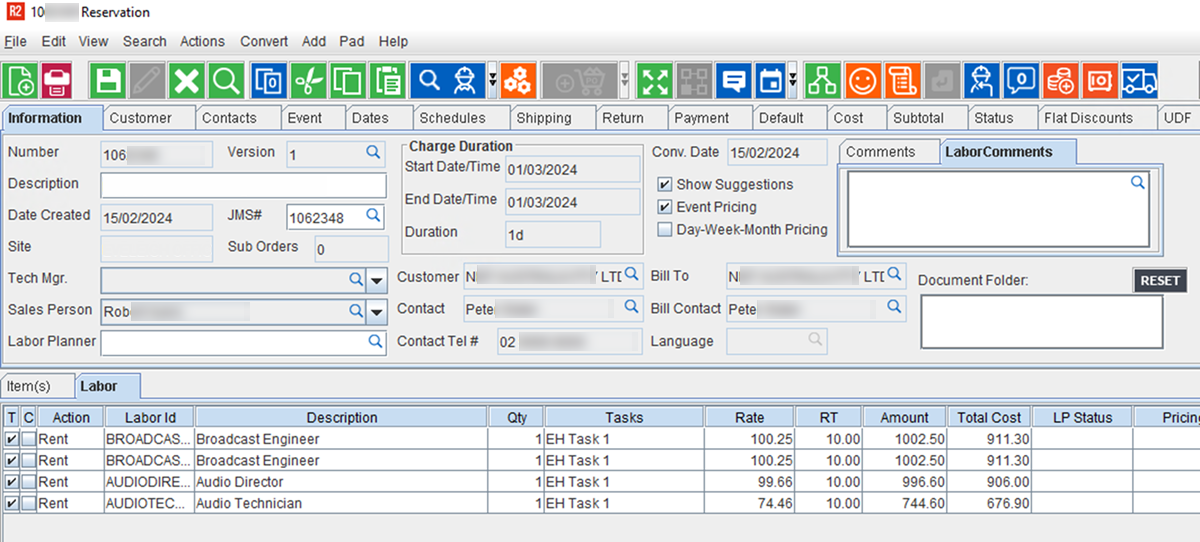
Assign positions and confirmed resources in R2 Labor.
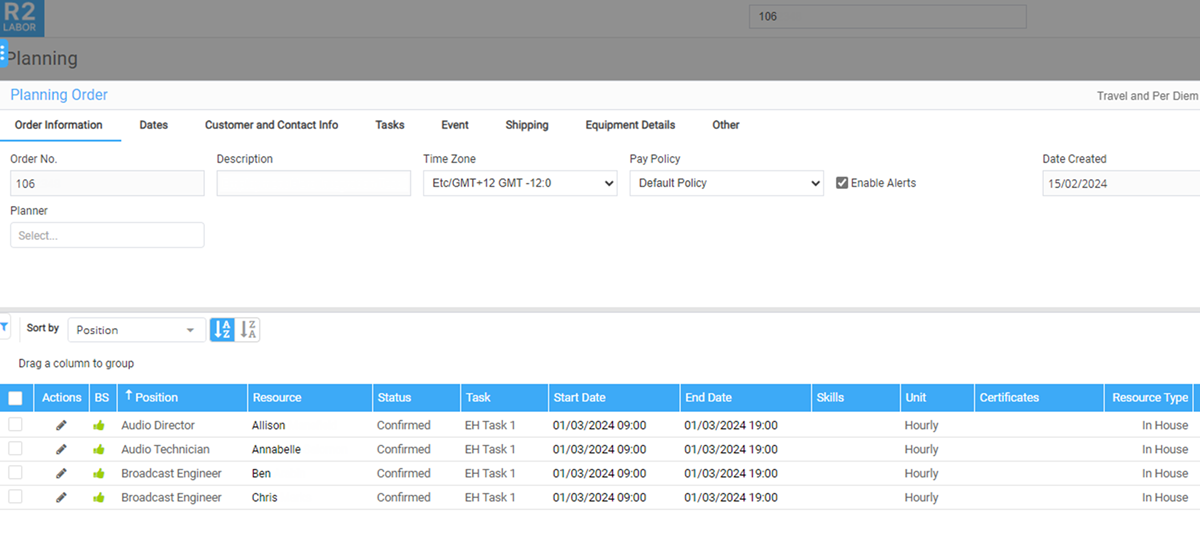
Run the script in the required mode(Dry_run/Live_run)
Timesheets will be populated in R2Labor for successful entries
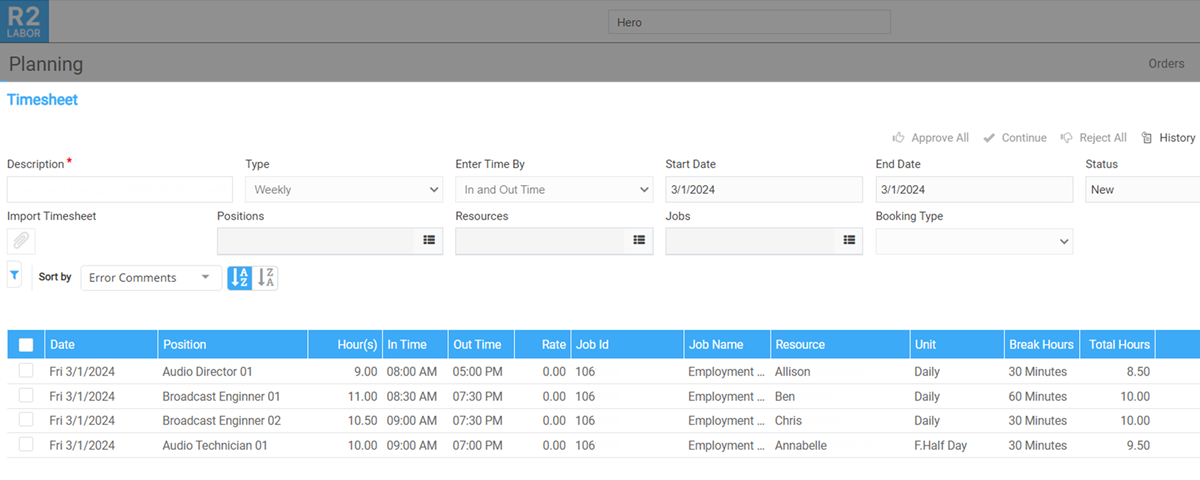
Scenario 2: Timesheets for Existing Calendar Events
Within R2Labor, this has two parts - Defining a Calendar Event and Creating a Calendar Event for a specific crew on a certain date.
Before extraction is initiated, it is important to ensure that: All the ‘Calendar Events’ needed from Employment Hero are in ‘Approved’ state, since the scripts will look for only those events.
Pre-create matching Standalone Events in R2Labor and EH
Records from EH will be mapped using
event_name_prefixTimesheets are created if matches are found; otherwise logged as failed
Scenario 3: Timesheets for Auto-Created Standalone Events
No manual calendar event creation in R2Labor required
Integration auto-creates standalone events in R2Labor if not exists
Timesheets created after event creation if valid
Multiple records for the same resource and same event/date will cause the entry to be skipped and logged as failure.
EH Data Integrity
No updates are made to Employment Hero
It is the user’s responsibility to mark records as “Processed” in EH
This avoids reprocessing on future runs

